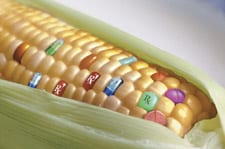Study: GE corn and soy cause stomach inflammation
This article was originally published in August 2013

A new study involving pigs raised on genetically engineered (GE) grain adds to the growing body of evidence that raises questions about the safety of GE foods.
The study, funded by the Australian government and published in the June issue of the peer-reviewed “Journal of Organic Systems,” found markedly higher stomach inflammation in pigs eating genetically engineered corn and soy.
The study
Australian scientists and U.S. researchers studied 168 just-weaned pigs on a U.S. pig farm for nearly six months. The pigs ate a typical diet containing corn and soy, until they were slaughtered.
Half the pigs ate common varieties of GE soy and GE corn, and the other half ate non-GE soy and corn.
“We chose a mixed diet instead of a single crop because this is usually what pigs and people eat,” researcher Dr. Judy Carman, one of the authors of the study, said in a statement.
“We chose pigs,” she said, “because they have a similar digestive system to humans, and because some of the investigators had been observing reproductive and digestive problems in pigs fed GE crops.”
Results
Some of the researchers previously had seen more intestinal problems in pigs on a GE diet, including inflammation of the stomach and small intestines, stomach ulcers, a thinning of intestinal walls, and an increase in hemorrhagic bowel disease.
In this study, researchers found few statistically significant differences on nearly 20 conventional parameters, such as weight gain, stomach ulcers and kidney health.
But the pigs raised on GE corn and soy showed significantly higher rates of “severe” stomach inflammation. Twenty-three had severely inflamed stomachs, compared to nine on a traditional, non-GE diet.
Males were more strongly affected. Female pigs were 2.2 times more likely to have severe stomach inflammation when eating GE food but males were 4 times more likely. “These findings are both biologically significant and statistically significant,” says Carman.
The researchers also found, on average, the uterus of pigs eating the GE diet, as a proportion of total weight, was 25 percent heavier. Scientists note this would be alarming if found in humans.
“The results indicate that it would be prudent for [GE] crops that are destined for human food and animal feed … to undergo long-term animal feeding studies, preferably before commercial planting, particularly for toxicological and reproductive effects,” concluded Carman and her colleagues.
Mandatory safety assessments are not required before GE crops are approved. Market approval is based on industry research alone. Learn more »
The validity of the pig study is drawing out pro-GE ideologues. Critics dismiss it as “junk science,” and biased by Carman, who is a professor at Flinders University in South Australia and has produced commentary critical of genetic engineering. They question the credibility of the journal (although it’s peer-reviewed) and criticize one provider of feed for the pigs because he’s a provider of non-GE animal feed. Nevertheless, even critics agree the methodology of the study was rigorous, and the findings merit further research.
Scientific debate
“Critics of GMOs are accused of letting ideology trump science,” wrote food policy writer Tom Laskawy in Grist. “But watching the scathing, knee-jerk reactions to any new piece of research that shines a less-than-positive light on GMOs, it makes me think that the shrill has found itself on the other foot.”
“This is something that needs to be followed up,” says Dr. Michael Hansen, senior scientist at Consumers Union. “It’s consistent with other findings. The critics of this study want to assume GE is safe and then try to tear down any study showing otherwise … That is an ideological position, not a good scientific one.”
The Center for Food Safety, a consumer advocacy group that often leads lawsuits over genetic engineering, says the pig study reflects “what many farmers have been reporting anecdotally for years.”
“This study raises serious questions about the long-term health impacts of genetically engineered foods,” Andrew Kimbrell, the center’s executive director, told the Chicago Tribune.
Sources:
- “A long-term toxicology study on pigs fed a mixed GM diet. Adverse effects of GM crops found.” Dr. Judy Carman, Flinders University, Australia.
- “Scientists debate new study on GMO-fed pigs.” James Andrews, Food Safety News.
- “Look who’s squealing now: GMO lovers freak over new study of sick pigs.” Tom Laskawy, Grist
